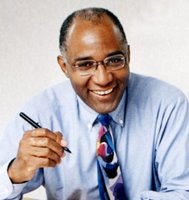'How urban societies disintegrate and become a breeding ground and a battlefield of extremism' .
For this evening Mr. Trevor Phillips, Chairman of the Commission for Equality and Human Rights (CEHR) was invited form the UK to give his view on the matter of ‘integration and migration’ in Europe.
Mr. Phillips gave a very detailed expose on the conflicts raised by the changing societies in most Europe states today. The reason I really admired his views is the fact that he really states what I also believe: the most important thing that should happen in order for all of us to live peacefully together is for the indigenous (Autochtonen in the Netherlands) to accept the fact that their society has changed: we are all here and nobody is going to leave. That mean that your society will have to have laws and institutions that are capable to cater to a diver society. The law will have to be there to impose equality, to create a situation in which no ones ethnic background should dictate it’s chances in live. Our institutions should be able to give all members of society equal chances, in education, health care, housing, political participation etc.
Paul Scheffer, a so called intellectual of the Left was asked to react on Mr. Phillips speech together with the young diplomat Arthur Kibbelaar, member of a advisory group for the Antillean Community.
Mr. Scheffer became famous in the Netherlands when he proclaimed the country was facing a ‘multicultural drama’. In the days of the uprising of rightwing anti- immigration atmosphere, he stated that because a lot of people of the so called ethnic minorities in Holland weren’t doing OK in the education and employment rates was a drama. The integration has failed! In the Fortuyn time the whole establishment agreed with this twisted view on the reality. Figures showed that more people pf ethnic origins were doing better in school and more young black and migrant students were attending higher education. It is true that the unemployment figures among ethnic minorities was still very high. But something like institutionalised racism by employers never came to his mind.
Of course, because he didn’t believe in ‘race’. This he said as a reaction to Mr. Kibbelaar very good contribution to the debate, in which he criticised the way the Dutch society treated citizens on different ways, based on their ethnic background. For example he mentioned the case of the Antillean community, which is constantly under attack of Dutch policy makers because of the criminal behaviour of a group of young Antilleans. The Dutch government wants to take the travelling rights away from young people of the Antilleans with a Dutch passport to prevent them from emigrant to the Netherlands from the islands. Also Mr. Kibbelaar pointed out the racism in the society.
Mr. Scheffer blatantly said he have to put ‘race’ behind us to get ahead. He gave us the scientific history about race as a construction which has been destroyed by the same science which invented it. In a debate about the future of Europe, he calmly said something like that. I was exploding on my chair with indignation. In my last trip to Curacao I was again pointed out as a possible drug trafficker at the air port and was asked questions and hold back for half an hour. I said: ‘they should stop one or two white people, too, just to pretend they’re not racist’ . But when confronted with this accusation, the Dutch minister of Justice just said it was a fact most drug traffickers were black. And Paul Scheffer has the audacity to say ‘race’ doesn’t exists. It is always the same story in which we see that Dutch society just simply denies racism and except us to go along to believe in the fairy tale. We just cannot, because reality knock on our door each day.
I left the debate very satisfied because a lot of people contra- attacked these statements and Mr. Phillips really gave me an impression the UK is really ahead of the ‘always knowing better’ Dutch! I really enjoyed his speech and the way he debated with the opponents. He was also very personal, using his own personal life in his speech.
Ten years ago that could have given me the will to relocate to London. The beautiful big city with much bigger and stronger black communities. I’m 35 now, and I know each story has different sides. The Netherlands also had for me the opportunity to study for example, and Amsterdam enriched me in so many ways. It is time to open our months now here in Amsterdam and Holland.
